Four American Public University (APU) doctoral students and I holding the APU flag right after the collaborative panel in Iceland. Image courtesy of Andreea Mosila.
By Andreea Mosila
Doctoral Student, Global Security
In the last week of June, several doctoral students and I attended the 29th International Conference of the Europeanists organized by the Council of European Studies (CES). The conference took place at the University of Iceland in Reykjavik from June 27-29. This group involved myself and four others:
- Janice Farkas, a doctoral student in strategic intelligence
- Anna Stallings, a doctoral student in global security
- Pedro Maldonado, a doctoral student in global security
- Tim Smario, a doctoral student in strategic intelligence
Related: Russia-Africa Summit and the Goals of Putin’s Government
How Did the Trip to Iceland Happen?
Our path to Iceland started in October 2022, when Dr. Elise Rainer, a full-time associate professor in the School of Security and Global Studies, introduced us to the call for proposals from the CES conference organizers. We decided to submit a panel proposal on the political psychology of world leaders, using papers we had written for a doctoral course called “Psychology of Actors in the Global Environment.” Our papers were written under the mentorship of Dr. Casey Skvorc, a full-time professor at the School of Security and Global Studies.
Despite our initial doubt that a panel of doctoral students would be accepted at an international conference of this magnitude, we received an acceptance letter on December 23, 2022. It caused great excitement – we were going to Iceland!
For Janice, it was not her first conference experience. But for the rest of us doctoral students, the CES conference fulfilled the doctoral program’s Year 2 foreign residency requirement to attend and present research at an international conference.
Related: What Sweden Joining NATO Will Mean for Russian Power Goals
Attending the CES Conference in Iceland
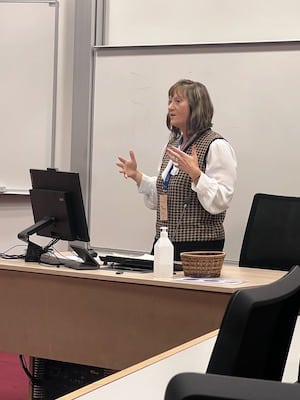
On the first day of the CES conference, Anna and I had individual presentations. Although we doctoral students had not initially submitted proposals during CES’s call for proposals, we contacted the conference organizers and asked permission to be added to panels with our current research topics. We were both granted a place on the appropriate conference panels.
Anna presented her paper “Emerging Global Security Issue: Money Laundering in Ukraine’s Financial Sector Hindering Development” for the panel, “The War in Ukraine.”
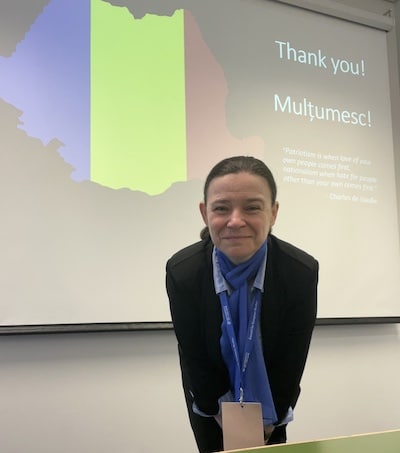
I presented my research paper, “The Challenge of Nationalism and Populism on Pandemic Response in Romania,” on a panel called “Reflections on Central and East European Populism.” Faced with an exclusively European audience, I had to answer many questions after my presentation.
Some of these questions involved controversial topics, related to the issue of nationalism and populism in Europe. Overall, the moderator praised the panel for the fascinating discussion it inspired.
On the second conference day, Pedro was the chair and moderator of the panel “New Perspectives on Democracy and Authoritarianism in Southern Europe.” While this event was not his first international conference, it was his first time serving as a panel chair and moderator. He moderated various topics, including fake news in contemporary Spain, authoritarian neoliberalism in Greece and the trickster politics of Mussolini.
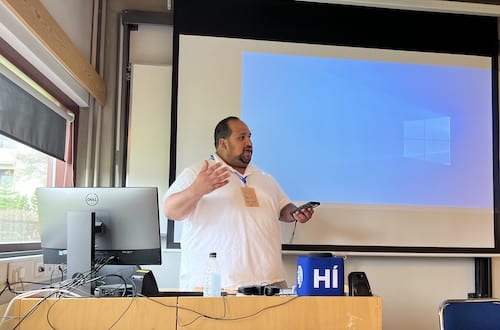
Pedro moderating a panel on democracy and authoritarianism in southern Europe. Image courtesy of Andreea Mosila.
The big day for our group was the final day of the conference. We presented on a panel called “The Political Psychology of World Leaders.”
I served as the chair and moderator. In addition, I presented a research paper, “Mikhail Gorbachev, a Transformational Leader.”
For this panel, the other four doctoral students also presented their research papers on various topics:
- Tim Smario – “Putin’s Psychological Red-Line”
- Janice Farkas – “Psychological Chess: Erdoğan and the Syrian Refugee Crisis”
- Pedro Maldonado – “Theory Application: Political Psychology of Fidel Castro”
- Anna Stallings – “Realism, Manipulation, and Social Identity in 21st-Century Russia”
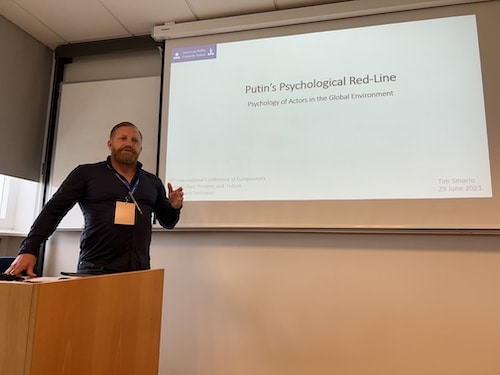
Tim presenting on Putin’s psychological red-line. Image courtesy of Andreea Mosila.

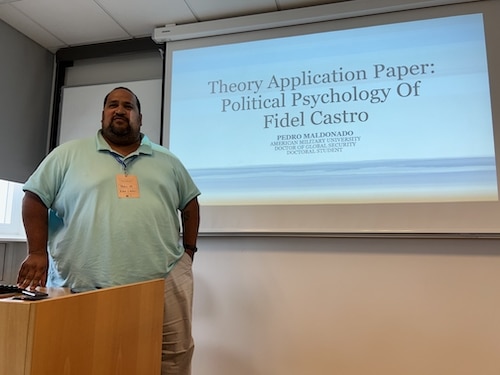
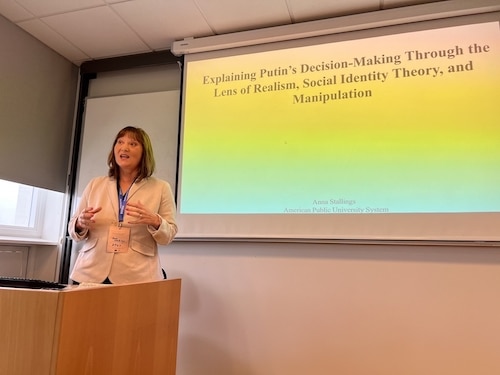
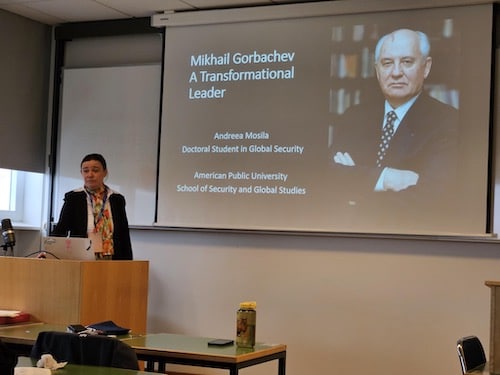
Despite being scheduled in the afternoon of the third conference day, we had a sizeable audience. We received several questions, feedback and even some criticism. We addressed that criticism in a professional manner and it gave us the opportunity to display our extensive knowledge.
Enjoying Iceland
Given its popularity with tourists, Iceland was an excellent choice for the conference. We had some time to enjoy this unique country, along with its delicious cuisine and hospitable people. We also encountered a rugged volcanic terrain, a brutal climate and the midnight sun.
On the first day of the CES conference, we had the amazing opportunity to attend a fascinating keynote lecture by Dr. Guðni Th. Jóhannesson, the president of Iceland. As a historian, President Jóhannesson discussed important moments in Iceland’s history, such as the Anglo-Icelandic Cod Wars and the 2008 economic crisis that almost bankrupted Iceland’s economy. He also addressed the issues Iceland is facing in the 21st century, including climate change.
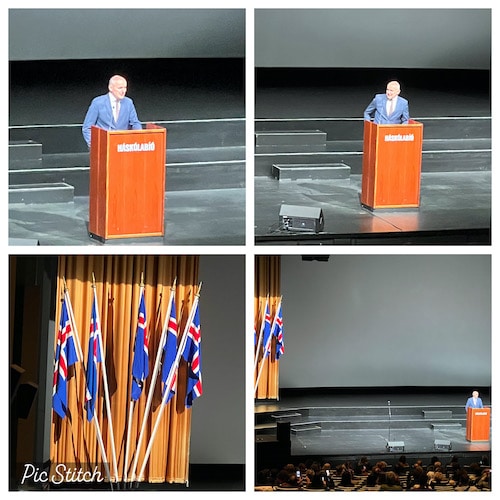
When we visited Iceland, we witnessed some of the hardships discussed by President Jóhannesson. Despite the hostile environment and an ongoing fight for survival, Iceland’s beauty is in its desolate, volcanic land and brutal climate, as well as its people.
The Icelanders are kind and friendly. They love their land deeply, and they would do anything to make you love it, too.
Their humor is delightful, and their love for Iceland is contagious. It is impossible not to fall in love with the Icelanders, their passion for Iceland, their sagas and their welcoming attitude.
They welcome tourists wholeheartedly, but also immigrants, asylum-seekers or anyone who wants to live, work, and love Iceland. This nation has 350,000 people, of which 150,000 are immigrants.
Some of the highlights of our Iceland trip included exploring local sites and culinary adventures.
Anna got to see the stunning Skógafoss, a waterfall in the south of Iceland, and other landscapes along the southern coastline.
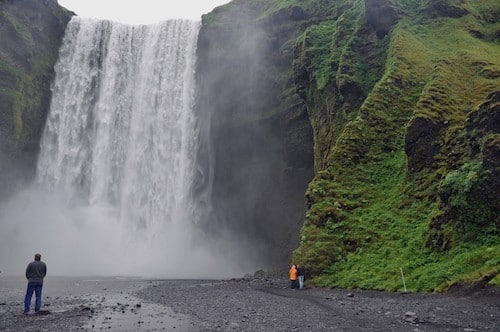
Pedro’s adventurous character took him to several Icelandic cuisine restaurants in Reykjavik. Among other interesting Icelandic dishes, he got to experience his first whale steak.
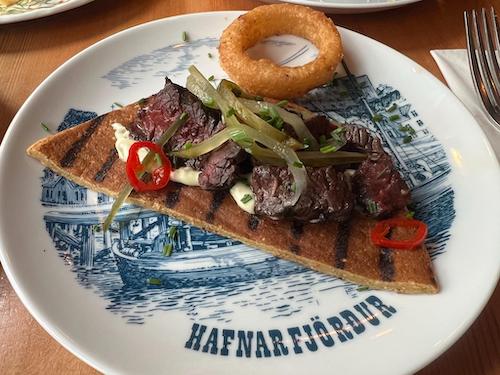
My love for hiking and climbing could not be more at home in Iceland. In southern Iceland, I got to ice-climb the Sólheimajökull glacier between the volcanoes Katla and Eyjafjallajökull and drink glacier water Viking style!
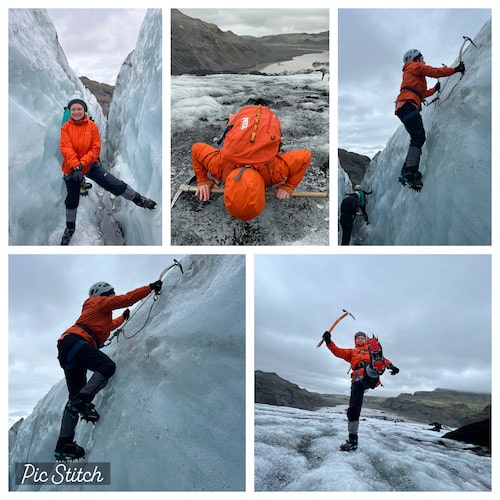
I also hiked the most recent volcanic eruption sites at the Fagradalsfjall volcano on the Reykjanes Peninsula.
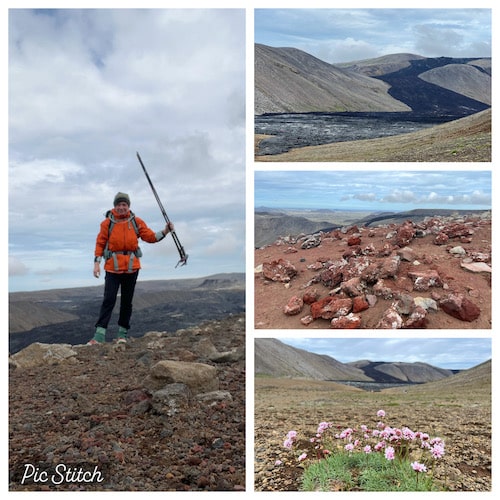
Hiking the most recent volcanic eruption sites at the Fagradalsfjall volcano. Image courtesy of Andreea Mosila.
Last but not least, we took a chance at the Icelandic pronunciation, if for no other reason but to brag about the beautiful places we visited: Skógafoss, Seljalandsfoss, Sólheimajökull, Fagradalsfjall and Eyjafjallajökull!
We also learned a funny trick to pronounce the name of the Sólheimajökull glacier. To say the name of this glacier, just say as fast as you can, “So I ate my yogurt!”
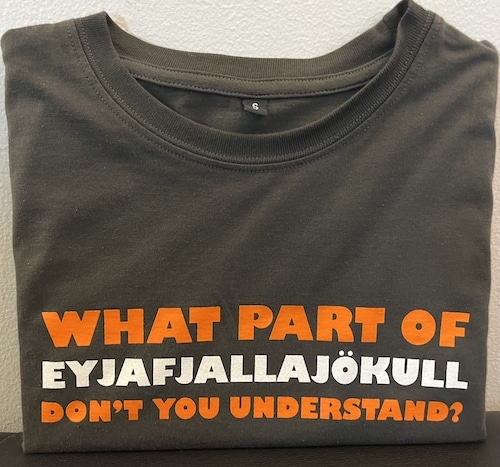
Individual Reflections from Doctoral Students about the Iceland Trip
We also had the time to reflect on our experiences in Iceland. Janice was grateful to be included in the group of doctoral students and to present her research on Turkish President Recep Tayyip Erdoğan and the psychological aspects of his policies about Syrian refugees.
She said, “This was my first time traveling to Iceland, and I was impressed by the landscape’s overall beauty and the country’s openness. The city of Reykjavík reminded me of something from a Norse storybook from long ago and was charming and quaint. Unfortunately, I could not do much sightseeing due to travel issues, but I enjoyed the conference a great deal.”
Asked about the CES conference and her favorite experience, Janice added, “The most wonderful part of the trip for me was getting to know the other doctoral students from the University and sharing ideas and lessons with them. Being invited to be a part of the group and traveling and presenting with them was an honor and an experience I will never forget.
“At the conference, many sessions I attended included scholars reviewing studies performed on counter-extremism programs and a panel about Greece and Turkey. Those scholars were experts on those two countries’ histories, and attending this panel supported my interests and presentation. I was surprised at how many academics are focused on counter-extremism programs throughout Europe, which has also been a focus in counterterrorism in the United States.”
For Anna, the key takeaways from the CES conference included the fact that it was an in-person conference, allowing scholars immediate feedback. Anna observed, “That feedback was invaluable in connecting with other scholars because they were right there, either asking questions or commenting on the presentation’s content.
“That helps tremendously in building personal relationships that cannot be replicated to the same level online. Listening to the research methods and how and why scholars used these methods was incredibly insightful, particularly for interdisciplinary research methods.”
Anna added, “I attended many political economy panels at the CES conference. That was incredibly insightful because political economy scholars use quantitative or mixed research methods.
“Some presentations that included mixed methods were pretty revealing, mainly if the quantitative research methods were explained well, along with the qualitative context. Overall, presenting at an international conference was a great experience, and I am glad to have taken part in the panels.
“In addition, I made many connections and networked as well, so that was a great benefit of going to an in-person conference. Last, preparing to answer questions and provide sources is a great way to gain credibility during the conference.”
Of his experience with Iceland and Reykjavik, Pedro said, “Iceland is absolutely beautiful. Reykjavík has unique landscapes, geothermal activity and a vibrant culture.
“The city offers a mix of modern amenities, historical landmarks, and a thriving arts and music scene. The scenery highlights stunning natural beauty, including geysers, hot springs and glaciers.”
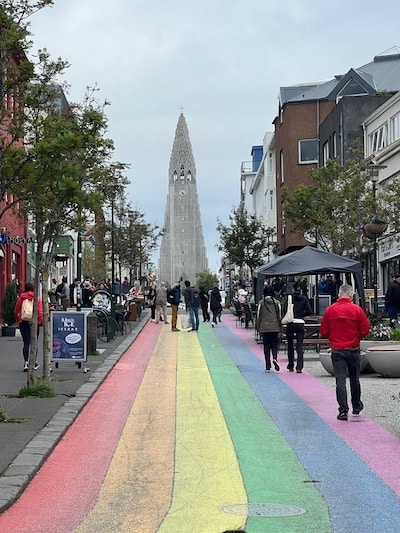
Of the CES conference, Pedro said, “The CES conference was an incredibly fun and intellectually stimulating experience for me. The atmosphere buzzed with excitement as scholars and experts from diverse backgrounds gathered to exchange cutting-edge ideas and discoveries.
“I enjoyed engaging in panel discussions, thought-provoking presentations and interactive workshops. The conference also provided a platform for knowledge-sharing and collaboration.
“The excitement of meeting my colleagues, networking with potential collaborators and making new friends reinforced a sense of camaraderie. Beyond the formal sessions, social events and cultural excursions offered a wonderful chance to unwind and explore. I had an incredible experience, and I hope to go back soon.”
He added, “The International Conference of the Europeanists is a major academic conference that brings together scholars, researchers, policymakers and practitioners from around the world to discuss various aspects of European studies. The Russian war against Ukraine overshadowed my presentation on Fidel Castro, but I enjoyed several conversations with experts and scholars about the link between socialism in Latin America and recent trends in Europe. The experience of visiting Iceland for the first time and enjoying different aspects of the conference, along with spending time with my cohort for the first time, was a wonderful opportunity for me.”
For me, the academic highlight of this Iceland trip was to meet my fellow doctoral students, exchange ideas and collaborate on a conference panel. We have known each other for almost two years and worked together remotely towards the doctoral degree; however, meeting in person was invaluable.
By doing so, we doctoral students strengthened our professional relationships and forged lifelong friendships. In addition, getting to know Iceland and its people, their struggle and resilience, was the experience of a lifetime.
About the Author
Andreea Mosila is a doctoral student in global security at the University’s School of Security and Global Studies. She holds a bachelor’s degree in space studies and a master’s degree in political science from American Public University, as well as a master’s degree in aeronautics from Embry-Riddle Aeronautical University.
Andreea works at NASA Jet Propulsion Laboratory in Pasadena, California, in a science support role and is as an adjunct professor of political science at Georgia Military College. Her research interests include the role of spacefaring in global security, the threat of AI-generated disinformation to democratic systems and non-traditional security threats in island nations.

Comments are closed.